Filter by

Accounting for Managers
Answer: Financial accounting1 focuses on providing historical financial information to external users. External users are those outside the company, including owners (e.g., shareholders) and creditors (e.g., banks or bondholders). Financial accountants reporting to external users are required to follow U.S. Generally Accepted Accounting Principles (U.S. GAAP)2 , a set of accounting rules that…
- Edition
- -
- ISBN/ISSN
- -
- Collation
- -
- Series Title
- -
- Call Number
- 657 HEI a
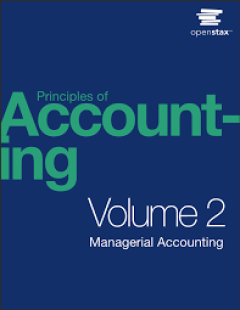
Principles of Accounting, Volume 2: Managerial Accounting
Principles of Accounting is designed to meet the scope and sequence requirements of a two-semester accounting course that covers the fundamentals of financial and managerial accounting. This book is specifically designed to appeal to both accounting and non-accounting majors, exposing students to the core concepts of accounting in familiar ways to build a strong foundation that can be applied…
- Edition
- -
- ISBN/ISSN
- -
- Collation
- -
- Series Title
- -
- Call Number
- 657 FRA p

Principles of Accounting, Volume 2: Managerial Accounting
Principles of Accounting is designed to meet the scope and sequence requirements of a two-semester accounting course that covers the fundamentals of financial and managerial accounting. This book is specifically designed to appeal to both accounting and non-accounting majors, exposing students to the core concepts of accounting in familiar ways to build a strong foundation that can be applied…
- Edition
- -
- ISBN/ISSN
- -
- Collation
- -
- Series Title
- -
- Call Number
- 657 FRA p
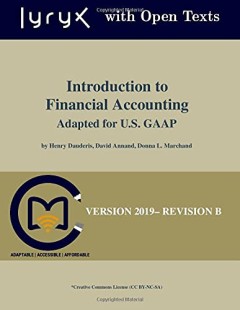
Introduction to Financial Accounting Adapted for U.S. GAAP
AccounƟng involves a process of collecƟng, recording, and reporƟng a business’s economic acƟviƟes to users. It is oŌen called the language of business because it uses a unique vocabulary to communicate informaƟon to decision makers. To understand accounƟng, we first look at the basic forms of business organizaƟons. The concepts and principles that provide the foundaƟon for financ…
- Edition
- -
- ISBN/ISSN
- -
- Collation
- -
- Series Title
- -
- Call Number
- 657 DAU i
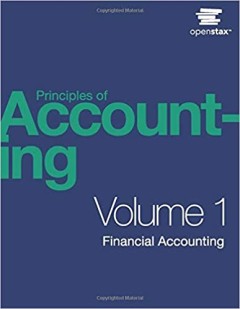
Principles of Accounting Volume 1 Financial Accounting
Principles of Accounting is designed to meet the scope and sequence requirements of a two-semester accounting course that covers the fundamentals of financial and managerial accounting. Due to the comprehensive nature of the material, we are offering the book in two volumes. This book is specifically designed to appeal to both accounting and non-accounting majors, exposing students to the core …
- Edition
- -
- ISBN/ISSN
- -
- Collation
- -
- Series Title
- -
- Call Number
- 657 MIT p
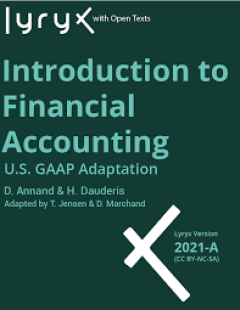
Introduction to Financial Accounting: U.S. GAAP Adaptation
This textbook is an adaptation by D. Marchand and Athabasca University of the original text written by D. Annand and H. Dauderis. It is intended for use in entry-level college and university courses in financial accounting. A corporate approach is utilized consistently throughout the book. The adapted textbook includes multiple ancillary student and instructor resources. Student aids include s…
- Edition
- -
- ISBN/ISSN
- -
- Collation
- -
- Series Title
- -
- Call Number
- 657 ANN i
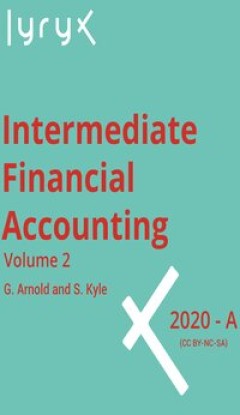
Intermediate Financial Accounting Volume 2
This new text by G. Arnold and S. Kyle, developed in collaboration by Athabasca University and Lyryx, is intended for the second of two in Intermediate Financial Accounting courses. It presumes that students have already completed the Introductory Financial Accounting, and the first Intermediate Financing Accounting course. The text reflects both current International Financial Reporting Standa…
- Edition
- -
- ISBN/ISSN
- -
- Collation
- -
- Series Title
- -
- Call Number
- 657 ARN i
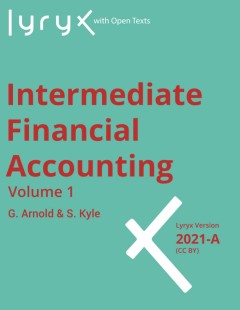
Intermediate Financial Accounting Volume 1
This text is intended for a first course in Intermediate Financial Accounting. It presumes that students have already completed one or two Introductory Financial Accounting courses. The book reflects current International Financial Reporting Standards (IFRS), such as IFRS 15 - Revenue from Contracts With Customers. It focuses on more difficult intermediate accounting topics that match prerequis…
- Edition
- -
- ISBN/ISSN
- -
- Collation
- -
- Series Title
- -
- Call Number
- 657 ARN i

Accounting I
The purpose of accounting is to provide a means of recording, reporting, summarizing, and interpreting economic data. In order to do this, an accounting system must be designed. A system design serves the needs of users of accounting information. Once a system has been designed, reports can be issued and decisions based upon these reports are made for various departments. Since accounting is …
- Edition
- -
- ISBN/ISSN
- -
- Collation
- -
- Series Title
- -
- Call Number
- 330 PET a

Accounting II
The development of accounting concepts and principles is closely related to the economic growth of the United States, as businesses grew in size, and outsiders increased their demand for financial information. Accounting principles focus on the users of accounting information. Principles have developed over a long period of time, and are continuously subject to revision as information needs…
- Edition
- -
- ISBN/ISSN
- -
- Collation
- -
- Series Title
- -
- Call Number
- 330 PET a
 Computer Science, Information & General Works
Computer Science, Information & General Works  Philosophy & Psychology
Philosophy & Psychology  Religion
Religion  Social Sciences
Social Sciences  Language
Language  Pure Science
Pure Science  Applied Sciences
Applied Sciences  Art & Recreation
Art & Recreation  Literature
Literature  History & Geography
History & Geography